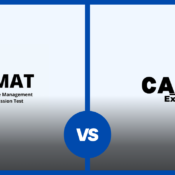
Advantages of pursuing an MBA early in your career
Most candidates who aspire to get an MBA typically have a median work experience of around 5 years. While work experience is critical for the classroom experience during the MBA program, a lot of professionals delay their decision to pursue an MBA as they put too much weightage on work experience. One important aspect to keep in mind is that by delaying your decision, you also delay your MBA career trajectory by a couple of years.
In our experience, there are multiple advantages of pursuing an MBA early in your professional career. Early career candidates have typically between 2-4 years of work experience with a strong holistic profile.
1. Fastrack Career :
An MBA is a valuable credential to employers.Those who have completed their MBA are given priority for leadership positions and often become eligible for quick promotions. By getting an MBA early in your career, you are positioning yourself for early career success which can give you a headstart in your career in the long term. There are several MBA programs that are open to candidates with lower work experience specially in the United States. Working with a good MBA Admission Consultant can help you explore some of these early career MBA options which can help unlock your opportunities in your career at an early stage.
2. Global Perspective :
Most large companies have businesses around the globe and often expect their employees to be comfortable working in diverse cultures. Thus, getting a global perspective and building on cross cultural experience is critical for moving up the ladder in a large corporations. Pursuing an MBA early in one’s career exposes them to a global setting at early stage and this can prove to be instrumental in their professional success.

With the help of MBA’s Competitive Edge Early in Career those who pursue an MBA are better prepared to handle the obstacles of doing business internationally because they have a deeper awareness of the global business environment at an early age.
3. Industry Knowledge and Market Awareness
A lot of professionals use the MBA to make a industry or a career transition pretty late in their careers. Students who pursue their MBA early on are more likely to start in their desired industry / function of choice which can enable them to build on their industry knowledge and gain meaningful experience in a Post MBA role. The added time spent in the industry / function is particularly helpful to those vying top leadership positions.
Skills enhancement through an early MBA helps professionals stay abreast of market developments and build their credibility in their domain at an early stage which can result in higher salaries and more promotions. MBA programs are meant to be dynamic, with professional guest lecturers and real-world case studies to bring students up to date with the ever-changing business landscape. For early-career professionals, having this current knowledge is an advantage that enables them to make valuable contributions to their employers.
4. Stamp of Credibility:
An MBA degree is a commonly acknowledged indicator of academic and professional success. Professionals who pursue an MBA early in their careers are perceived to be more credible by peers, clients, and employers. This recognition can lead to partnerships, promotions, and new prospects in a highly competitive employment market.
5. Adaptability and Versatility:
MBA programs aim to create flexible, adaptive professionals who can handle a wide range of business challenges. By pursuing an MBA relatively early in one’s career, these professionals gain the ability to think creatively, adapt to changing conditions, and assess problems from diverse perspectives. These traits are critical for professional development and applicable across industries and companies. Thus, by gaining this exposure at an early stage, one can aspire to build on his professional experience and take on ambiguous business challenges which are difficult for other employees in the organization. This ability can help differentiate a professional from others and can prove to be valuable in his professional journey in the long run.
Such abilities are essential in a company environment that changes quickly, where success depends on flexibility and agility.
6. Critical Thinking and Problem Solving:
An MBA helps build the capacity to understand complicated business issues and formulate workable solutions through critical thinking and problem-solving skills. In fact, problem solving is one of the highlights of the MBA program where everyone in the classroom shares their perspective on the problem and their interpretation of the solution.

Early-career professionals are better prepared to take on business challenges when they develop these critical skills during their MBA. They witness Career acceleration, as their ability to think critically helps them stand out in their careers by encouraging a more strategic approach to decision-making. Most organizations value professionals with critical thinking and strong problem solving skills.
7. Nurtuing Presentation and Communication Skills:
Strong presentation and communication style are essential for success in business roles. Group projects, presentations, and public speaking opportunities are common elements of MBA and Young Professionals tend to benefit the most from exposure to these activities at an early stage in their career.It becomes increasingly difficult for senior professionals to change their presentation and communication style with age. Thus, MBA program helps early-career professionals become more adept at communicating their ideas, engagingly presenting information, and leading others. These are abilities that are useful in managerial and leadership positions.

8. Alumni Network Access:
Most good MBA programs have an extensive alumni network, which helps in the professional development of their current and former students . In their early careers, graduates from Early MBA programs can access this network and build meaningful connections with others from their program. This network can prove to be immensely beneficial for global opportunities for mentorship, career guidance, and possible joint ventures, providing continuous assistance along their career path.
9. Learning Opportunities through Experience:
MBA programs frequently include experiential learning
Initial learning experiences, including consulting assignments, industry partnerships, and internships. These hands-on experiences help early-career professionals apply their academic knowledge to practical settings. By utilizing a practical approach, they can better comprehend business dynamics and become ready for the intricacies of the working world.
To sum up, getting an MBA early in your professional life is an investment in your future. The numerous advantages include career acceleration, networking opportunities, leadership development, and comprehensive skill development. Early-career professionals who pursue an MBA program establish themselves as flexible and dynamic leaders with the know-how to successfully negotiate the intricacies of today’s corporate environment.



